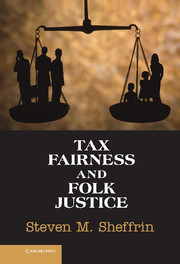Book contents
- Frontmatter
- Dedication
- Contents
- Preface
- Glossary of Terms in Psychology, Philosophy, and Economics
- 1 Approaching Tax Fairness
- 2 The Foundations of Folk Justice
- 3 Fairness and the Property Tax
- 4 Should We Redistribute Income through Taxation?
- 5 Why Do People Pay Taxes?
- 6 Desert, Equity Theory, and Taxation
- 7 Concluding Perspectives
- Bibliography
- Index
7 - Concluding Perspectives
Published online by Cambridge University Press: 05 July 2013
- Frontmatter
- Dedication
- Contents
- Preface
- Glossary of Terms in Psychology, Philosophy, and Economics
- 1 Approaching Tax Fairness
- 2 The Foundations of Folk Justice
- 3 Fairness and the Property Tax
- 4 Should We Redistribute Income through Taxation?
- 5 Why Do People Pay Taxes?
- 6 Desert, Equity Theory, and Taxation
- 7 Concluding Perspectives
- Bibliography
- Index
Summary
Recent political and social events have been a virtual laboratory for the concepts of folk justice. Equity theory, procedural justice, and qualified fairness have all played their role in the highly visible political controversies that touch on finance and taxation.
Equity theory figured prominently in the latest mortgage crisis and proposals to try to remedy it. Perhaps the most famous example of this was the live “rant” on CNBC by reporter Rick Santelli as he reacted to a proposed solution to the mortgage crisis. Here is how political analyst Michael Barone described it:
“The government is promoting bad behavior,” Santelli began. The object of his scorn was the Obama administration’s Homeowners Affordability and Stability Plan providing aid to homeowners delinquent on their mortgages.
“This is America!” Santelli declared. “How many of you people want to pay for your neighbor’s mortgage that has an extra bathroom and can’t pay their bills?”
Granted, the words are not as elegant as those of Thomas Jefferson or John Adams. But the thought is clear. Santelli was arguing that the people who, in Bill Clinton’s felicitous phrase, “work hard and play by the rules” shouldn’t have to subsidize those who took on debts that they couldn’t repay.
Barone’s characterization of Santelli’s appeal is straight from equity theory. Even in today’s casual conversation you can hear similar sentiments, for example, that the housing crisis was caused by people who refinanced their homes and took money out to buy boats and cars and generally lived beyond their means. Equity theory is sensitive to moral hazard and possible cheating by ordinary people.
- Type
- Chapter
- Information
- Tax Fairness and Folk Justice , pp. 215 - 226Publisher: Cambridge University PressPrint publication year: 2013



